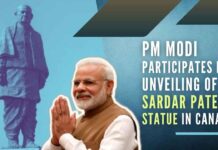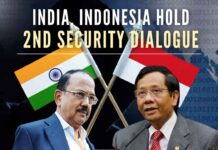Prime Minister Modi remarked Israel as an important partner in India’s quest for “sustained high growth and all round development”
[dropcap color=”#008040″ boxed=”yes” boxed_radius=”8px” class=”” id=””]I[/dropcap]t is widely accepted that Jews from Israel came to the Indian shores of Malabar in 562 BCE. They were welcomed by the local rulers and they are admitted without any conditions attached “as long as the world and the moon exists”.
Ever since then India’s Jewish community has lived and cherished without any persecution, in the full freedom.
India became independent on 15th August 1947 and Israel on 14th may 1948. Yet it took nearly four decades to openly start interacting with each other, though their contact dates back to centuries, and has a shared history and culture. India and Israel have many things in common during the last six decades. We share common bedrock of parliamentary democracy, our institutions are common, knowledge of English education and history of British colonialism. Both have survived with the hostile neighborhood. Both countries are facing internal and external threats in the form of radical Islamic terror and both nations have fought many wars for their existence.
The relation between India – Israel during 1948-1992:
[dropcap color=”#008040″ boxed=”yes” boxed_radius=”8px” class=”” id=””]I[/dropcap]ndia did not support the creation of Israel in 1948 on the grounds of its opposition to two nation theory (or) partition of the country on the ground of religion. India’s stand on the Palestine has a huge impact on relations with Israel. However, India recognized the state of Israel on 18th September 1950.
Israel had started a consulate in Bombay in 1953 but did not have full diplomatic relations until 1992. India continued to give unconditional support to the Palestinian cause. India didn’t even oppose the suicide bombers (or) Palestinian fedayeen. Even it justified such protests as an expression of genuine concerns of the Palestinian right to self-determination.
India preferred not to establish full diplomatic relations with Israel considering two factors. The sentiments of Muslims in the domestic level was one and other was the importance of Arab factor in India’s relations with West Asia.
India’s policy did not bring any results despite the unconditional support to the Palestinian cause. Arab world never supported India’s point of view on Kashmir. In the early 1990s, the growing insurgent activity in Kashmir sponsored by Pakistan worsened the domestic and regional security of India. At that point of time, OIC (Organisation of Islamic Countries) passed a resolution on Kashmir consistently criticizing India. Whereas, in stark contrast, Israel supported India on Kashmir.
If India had established full diplomatic relations with Israel much earlier India would have got a bargaining edge
Islamic countries supported Pakistan in its war against India. If India had established full diplomatic relations with Israel much earlier India would have got a bargaining edge (or) India should have made the Palestinian cause conditional. Even some prominent countries like Egypt and Jordan from the Arab world had established full diplomatic relations with Israel during 1980s. Since 1980s India has been suffering from cross-border terrorism. And the irony was Saudi Arabia has been the major financier of Pakistani-based terror groups propagating the Wahabi ideology.
India – Israel After 1992:
[dropcap color=”#008040″ boxed=”yes” boxed_radius=”8px” class=”” id=””]I[/dropcap]n 1992 Congress government led by The P.V. Narasimha Rao with a great sagacity made the decision to have full diplomatic relations with Israel. Since then we have never looked back.
Twenty-five years after opening the full diplomatic relations, we have seen an uncommonly phenomenal growth and diversity in the relationship between both the countries. It is very rare to find this level of speed in the movement of relations between any two countries and both countries have benefited with the steady course of the relationship.
With the change in the international balance of power after the disintegration of USSR and end of Cold War, both India and Israel found an opportunity to normalize relations. India’s Pro-Arab policy has not benefited India and interestingly Arab world rediscovered their respect for India only after India established formal ties with Israel. The most important factor in the India – Israel relation was India’s security concern. After the USSR was disintegrated it was not in a position to, either supply new hardware (or) to provide servicing to the existing weapons.
It is very rare to find this level of speed in the movement of relations between any two countries
Israel has expertise in serving Soviet weapons and also has expertise in defense technology. Israel could supply much cheaper weapons which may compete with the western weapons in terms of quality. Nicolas Blarel expert on India’s foreign policy writes that “Israel’s strategic importance to India become evident after Jerusalem’s assistance in the Kargil conflict with Pakistan in 1999. At the height of the crisis, Israel not only provided crucial surveillance and military equipment but also displayed the prowess of its defense technology.
Today India has multidimensional engagement with Israel though, defense and security remain the core, we have cooperation in agriculture, space technology, cyberspace etc. Former Prime Minister of India Atal Bihari Vajpayee called Israel as India’s ‘Natural Allay’ in 2003. Under the UPA government led by Dr. Manmohan Singh, a thin line was drawn between the bilateral interests and Israel policy towards Palestine heckled previous governments to have normal relations with Israel. Despite holding strong ties defense and trade with Israel, the UPA government did not initiate any significant diplomatic activism towards Tel Aviv. During the UPA regime, New Delhi’s position towards Israel has been articulated through the Islamic prism.
Present Status:
[dropcap color=”#008040″ boxed=”yes” boxed_radius=”8px” class=”” id=””]W[/dropcap]ith Prime Minister Narendra Modi’s visit to mark the 25 years of diplomatic anniversary milestone between India and Israel both the countries are undergoing historic transformation and a much-needed course correction.
This is the first ever visit by Indian Prime Minister to Israel. The new government has stopped viewing the relations with Israel through the ideological prism.
The transformational shift in India’s policy towards Israel under the current government is much needed and well calculated one. There are substantial reasons for present government to have close diplomatic relations with Israel. First reason, Israel’s willingness to share technology without any conditions, unlike the USA. Second, in modernizing the military and replacing aged Russian hardware. Israel was playing a crucial role given its expertise in defense manufacturing. Another reason, New Delhi strongly feels that Israel’s active participation in the “Make In India” program would certainly help India’s economic growth and provides jobs to many in the country. Fourth, the China’s factor. Over the last few years, Israel is said to be the China’s major defense supplier and this is the cause of concern to India.
The first meeting between Prime Minister Modi and Israel PM Netanyahu was held on September 2014 on the sideline of UNGA summit. It was first between the Israel and India premiers in over a decade. During the press statement, Netanyahu said the ‘Sky is limit’ for the relation between the two countries.
Areas of cooperation:
[dropcap color=”#008040″ boxed=”yes” boxed_radius=”8px” class=”” id=””]A[/dropcap]griculture: Israel’s prowess in agriculture and its expertise in the water treatment are unparalleled. The fruits of collaboration are visible in the crop yield. India has benefitted from Israels technologies in horticulture mechanization, protected cultivation, micro irrigation etc.,
Cyber Security: Our collaboration is set to expand on cyber security. Indian corporates are particularly vulnerable to the cyber attacks that caused a loss of around $ 4 billion in 2013. They will be benefitted from Israeli solutions. During the meeting with the PM Modi on Tuesday Netanyahu has pressed the importance of having close cooperation in cyber security and various other areas, termed Modi as “One of the most important Prime Ministers of the world”. Israels newly established National Cyber Security Authority aims to build links between civilian and military authorities of the two countries.
Economic: Under Make in India, Israel could be an ideal partner to technology transfer and Netanyahu has expressed his eagerness to explore the prospects of Israel defense firms making in India and reducing the manufacturing costs. Israel was the major trading partner in defense. Bilateral trade between both the countries would be approximately around $ 5 billion. Diamond trade accounts more than 50% of the bilateral trade. Many diamond dealers from India have been active in Israel much before both the countries have full diplomatic relations.
Defense: India is the world’s largest buyer of Israel’s weaponry. Israel is the third largest contributor of arms to India. Israel has technological independence in military production. Moreover, Israel has specialized in upgrading Russian equipment it emerged as an alternative source. The rise of Islamic extremist terrorism in both nations has generated a strong alliance between both the countries. The two countries have also increased cooperation in military and intelligence ventures since the establishment of diplomatic relations. The crucial part of relation was during the Kargil war in 1999. Israel provided crucial surveillance to India while the USA rejected and also supplied artillery shells.
Modi First Indian Prime Minister to visit Israel:
[dropcap color=”#008040″ boxed=”yes” boxed_radius=”8px” class=”” id=””]P[/dropcap]rime Minister Narendra Modi has arrived in Tel Aviv on Tuesday, becoming the first Indian Prime Minister to visit Israel.
PM Netanyahu has gone beyond the protocol to welcome PM Modi at Ben Gurion airport, an honor only reserved for US President and the Pope, Netanyahu’s entire cabinet was also present. While terming Prime Minister Modi’s visit as historical Netanyahu hailed Modi as “a great leader of India and a great world leader” and said, we have been waiting for the last 70 years for the visit of Indian Prime Minister.
Meanwhile, Prime Minister Modi remarked Israel as an important partner in India’s quest for “sustained high growth and all round development”. He said his visit was about the strength of two societies and their strong partnership.
India and Israel are holding centuries-old links between two societies and now, their partnership was strong and sustained upswing since the establishment of full diplomatic relationship 25 years ago.
Note:
1. The views expressed here are those of the author and do not necessarily represent or reflect the views of PGurus.
- Glimpse Into The 25 Years Of India Israel Relations - July 7, 2017
- Ambedkar – A visionary & the Father of Indian Constitution - April 15, 2017
- Terror Attacks In Pakistan: What It means To The Region - March 7, 2017










